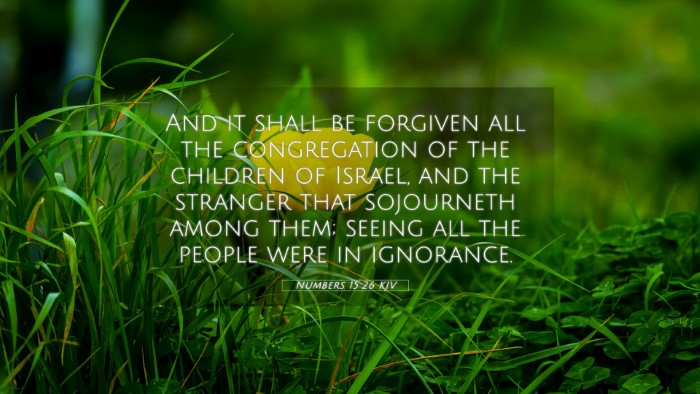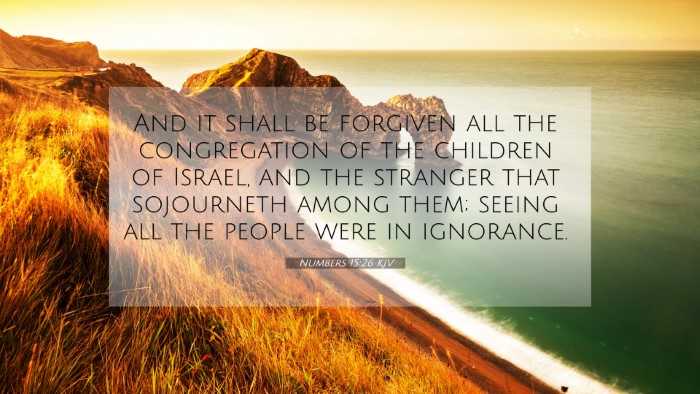Understanding Numbers 15:26
In Numbers 15:26, the text states: "And it shall be forgiven all the congregation of the children of Israel, and the stranger that sojourneth among them; for all the people were in ignorance." This verse emphasizes God's mercy and the provision for forgiveness even when individuals are in ignorance of their wrongdoing. Below, we explore the insights from esteemed public domain commentaries.
Summary of Interpretations
This verse encapsulates key themes of forgiveness, communal responsibility, and the nature of sin in relation to knowledge and intention.
-
Matthew Henry's Commentary:
Matthew Henry highlights that this verse shows the graciousness of God in forgiving those who commit errors unknowingly. He stresses the importance of the collective nature of the community in sin and forgiveness, showing that when one member sins, the entire congregation may share the consequences. He implies that ignorance does not excuse sin, but it does offer a pathway to grace when recognized.
-
Albert Barnes' Notes:
Barnes elaborates on the concept of 'ignorance' as he suggests that although the sins were committed in ignorance, it is critical that the congregation seeks forgiveness earnestly. He further notes the inclusion of strangers sojourning among the Israelites, which signifies God's overarching mercy extended to all who live among His people.
-
Adam Clarke's Commentary:
Clarke points out the social implications of this verse, arguing that God's law not only governs personal conduct but also communal relations. He emphasizes that the community must be vigilant about its collective actions to avoid unintentional transgressions. Clarke also draws attention to the way God's love manifests through His forgiveness of the collective ignorance of the people.
Thematic Connections and Cross-References
This verse opens the dialogue on several significant themes found throughout the scriptures regarding forgiveness, ignorance, and the nature of sin. Below are cross-references that relate to Numbers 15:26:
- Leviticus 4:2: Addresses unintentional sins and the prescribed means of atonement.
- Psalm 19:12: Speaks about the hidden faults and need for forgiveness.
- James 4:17: Highlights the sin of knowing what is right and failing to do it, thus contrasting ignorance with knowledge.
- Isaiah 53:6: Discusses the collective nature of sin, as all have strayed and require forgiveness.
- 1 John 1:7: Connects to the idea that the blood of Christ cleanses us from all sin—including those committed in ignorance.
- Romans 5:20: Explains that where sin increased, grace abounded all the more, pertinent to God's forgiveness for ignorance.
- Luke 12:48: Explains the accountability based on knowledge and the responsibility that comes with it.
Insights from Inter-Biblical Dialogue
The connections between the Old and New Testaments provide a richer understanding of the themes present in Numbers 15:26. The notion of collective forgiveness is further explored in the New Testament, particularly where Jesus extends grace to those who do not know the full scope of their transgressions.
- John 9:41: "If you were blind, you would have no sin; but now you say, 'We see'; therefore your sin remains."
- Acts 17:30: "Truly, these times of ignorance God overlooked, but now commands all men everywhere to repent."
- Hebrews 9:7: Discusses how sins committed in ignorance are addressed through the sacrificial system.
- 1 Timothy 1:13: Paul reflects on his own ignorance before conversion and emphasizes God's mercy.
Practical Applications
Understanding Numbers 15:26 encourages believers to seek forgiveness not only on a personal level but also as members of a community. Acknowledging collective failures can lead to deeper spiritual growth and awareness as a faith community.
Tools for Cross-Referencing
Utilizing tools such as a Bible concordance, Bible cross-reference guide, and various resources for cross-referencing Biblical texts can enhance our understanding of scripture. These tools aid in uncovering the intricate connections between verses, themes, and teachings found throughout the Bible.
Conclusion
Numbers 15:26 serves as a profound reminder of God's mercy in the context of collective ignorance and the necessity for communal responsibility before Him. By exploring related verses, we can appreciate the depth of biblical teaching on forgiveness and the importance of grace in our faith journey.
Therefore, as we engage with this verse and its cross-references, we are led into deeper theological reflections on how God's justice and mercy interplay within our lives.



